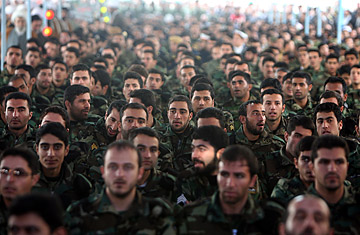
Members of Iran's élite Revolutionary Guards attend celebrations marking the anniversary of the Islamic revolution at the Behesht-e Zahra cemetery in Tehran
The outlook might look bleak for winning U.N. Security Council backing for ratcheting up sanctions to punish Iran's nuclear noncooperation, but Western powers have lately made more headway on unilateral measures. The U.S. Congress looks set to pass new measures that would punish third-country suppliers of gasoline to Iran — whose decrepit refining capacity forces it to import nearly 40% of its fuel consumption despite its massive oil reserves. European leaders last weekend discussed introducing unilateral continent-wide measures, and a growing number of companies involved in trade with Iran have begun to cut ties as a result of the growing pressure for sanctions.
Still, few officials believe that the measures under consideration are likely to change Iran's behavior. And the Western powers remain focused on trying to win Security Council backing for a new round of sanctions. But China's refusal to support any new measures, and Russia's insistence that the latest proposals by the U.S. and its allies are too harsh, mean that any new sanctions adopted at the Security Council are unlikely to significantly increase the economic pain on Iran for staying its nuclear course.
The new measures being proposed at the Security Council and elsewhere are designed to target Iran's Revolutionary Guards Corps, the élite military service with sprawling economic interests that has become the key pillar of support for the current regime. They also aim to limit Iran's ability to finance international trade, stop gasoline exports to Iran and disrupt the access of Iran's oil exports to international markets.
China has taken the lead in pushing back against new sanctions at the U.N., arguing that dialogue with Iran needs to be given a lot more time to produce results. China's position is important to the Islamic Republic because of the growing energy ties between the two countries. China exports gasoline to Iran and has tens of billions of dollars invested in developing two large oil fields near Iran's border with Iraq. Chinese companies are also drilling offshore in Iran's giant South Pars natural gas field. Still, there are signs that officials in Beijing might be looking for less controversial places from which to buy much needed oil to fuel its own humming economy, especially as Iran has threatened to disrupt oil exports to countries that refuse to supply it with gasoline — and also to disrupt global oil markets if it comes under attack by any country. China's oil imports from Iran dropped from 500,000 bbl. a day to 250,000 bbl. a day between January 2009 and January 2010, while it bought far more oil from Angola, Brazil and Russia, according to the Paris-based International Energy Agency. "China might be seeing where else they could get oil," says Christopher Segar, an Iran-oil analyst at the IEA.
Those pressing for sanctions will also be encouraged by new developments in the oil world. Lloyds and Munich Re, two major insurance companies, have announced that they will no longer insure cargo in and out of Iran, which produces 4 million bbl. of oil a day. Global oil brokers Vitol and Trafigura have said they will no longer make deliveries of refined gasoline to Iran, while Shell, Total and BP have said they will no longer supply gasoline to the Islamic Republic. Those suppliers could be replaced by Chinese, Malaysian and other Asian companies, but that could force Iran to spend more on gasoline imports. With fewer suppliers, exporting gasoline to Iran "is a seller's market," says Segar.
Despite the progress being made on sanctions, however, analysts are pessimistic over the prospects for the new measures breaking the stalemate. Three previous rounds of U.N. sanctions and various unilateral measures by Western countries have done nothing to change Tehran's commitment to its nuclear program. New sanctions "will be a squeeze on Iran, but this is not likely to change Iran's policy towards its nuclear program," says Cliff Kupchan, an Iran specialist and director of the Eurasia Group in Washington. Instead, he says, "we will very likely face a choice of accepting a nuclear Iran, or using military force."
Iran, meanwhile, is preparing to absorb the body blow of new sanctions: its parliament has proposed decreasing the ration of heavily subsidized gas that Iranians are allowed to buy each month, from 80 L (about 21 gal.) to 60 L (about 16 gal.) — above that amount, the price at the pumps would double. Such measures might limit the impact of gasoline sanctions on Iran's economy, but the resulting hardship could provide grist for Iran's feisty political opposition, which is seeking to focus its efforts on challenging the regime on economic issues in order to widen its support base. "With the E.U., U.S. and Russia all on side, it [would] be more difficult for [Iranian President Mahmoud] Ahmadinejad to say, 'It's an American plot, gas prices are going up and it is all the Americans' fault,' " says Kupchan. "They might say that, but it will be more difficult to argue it."
